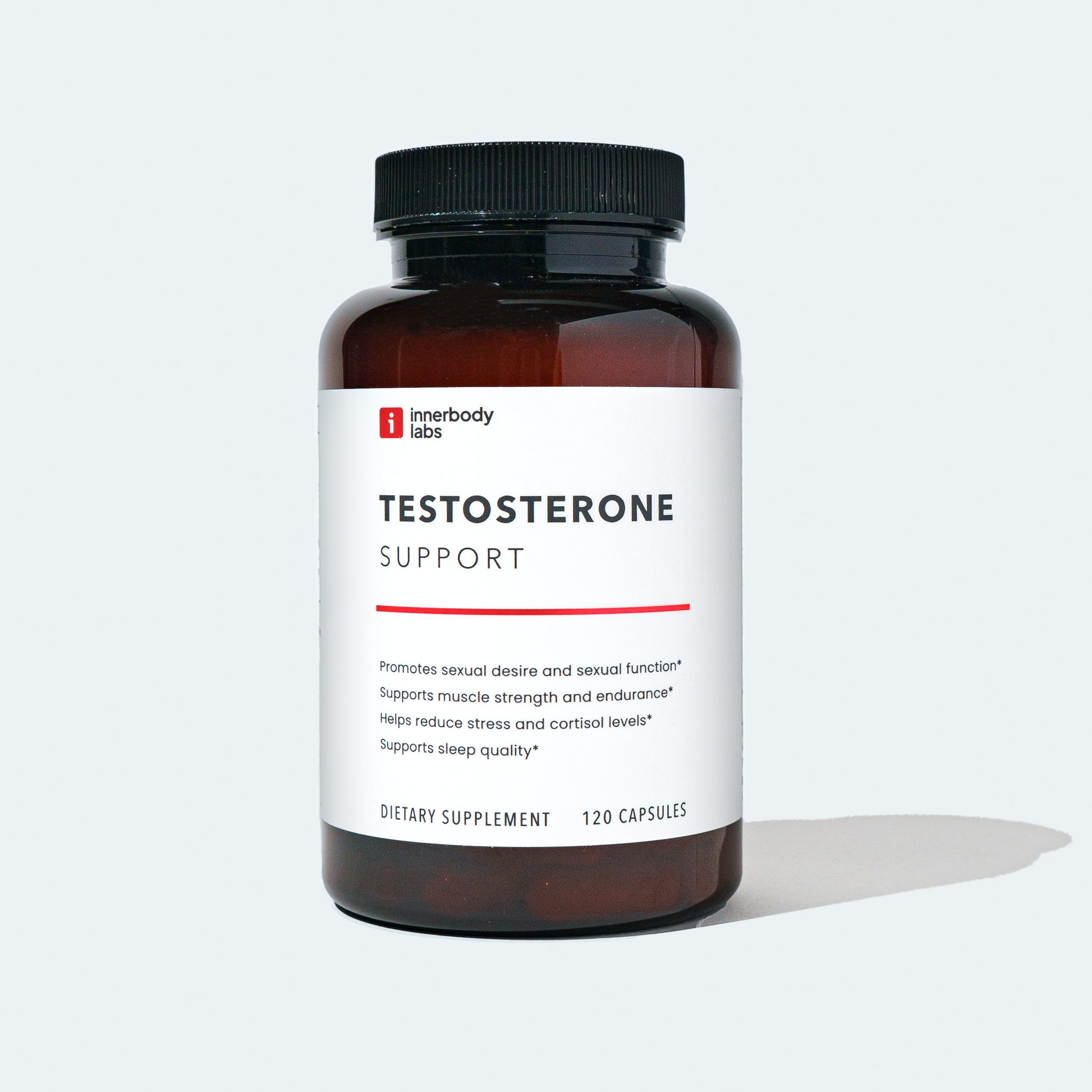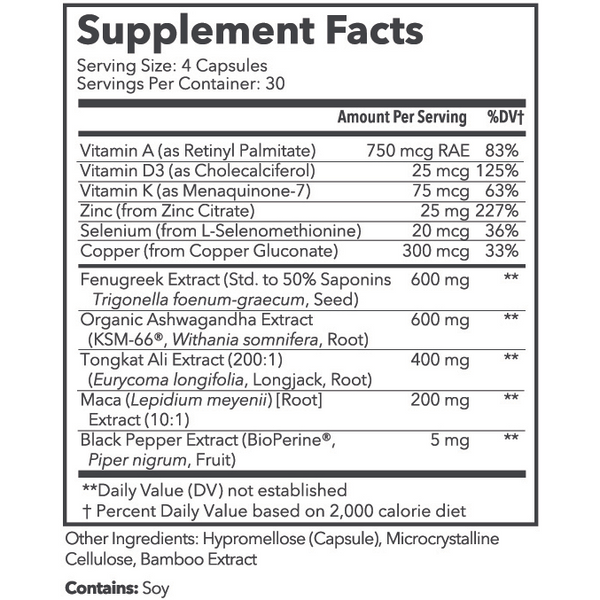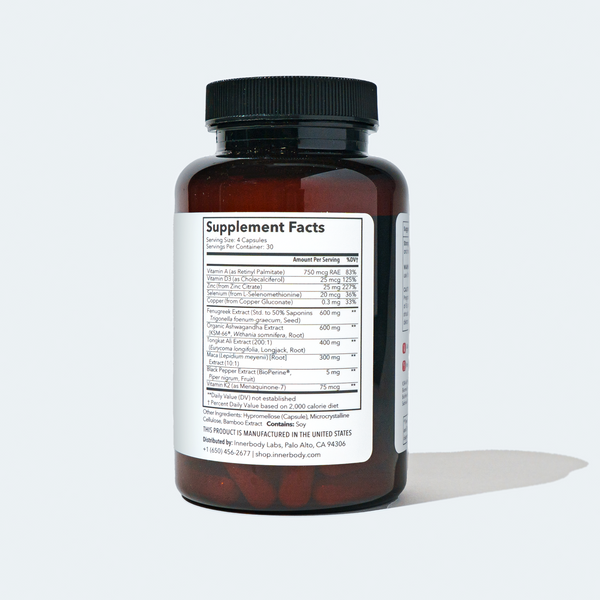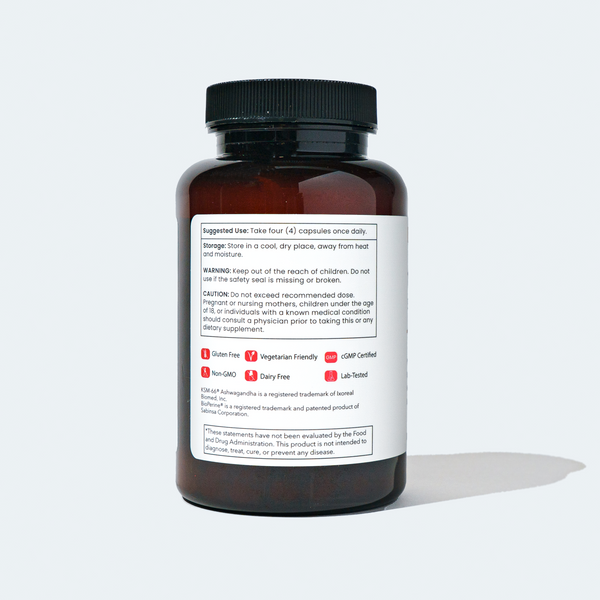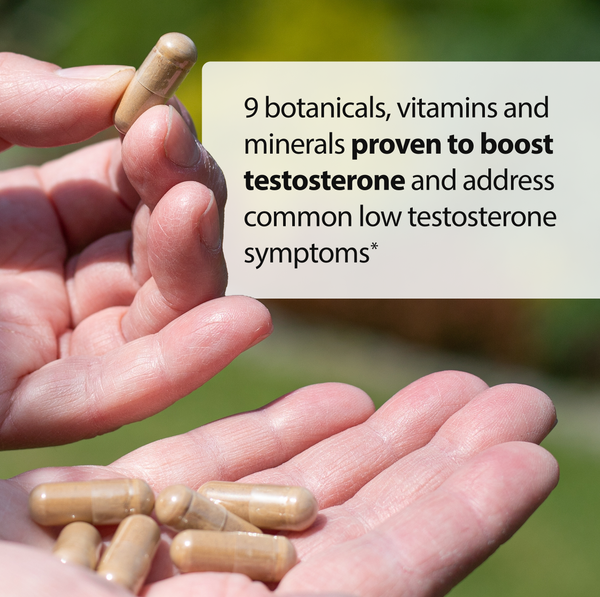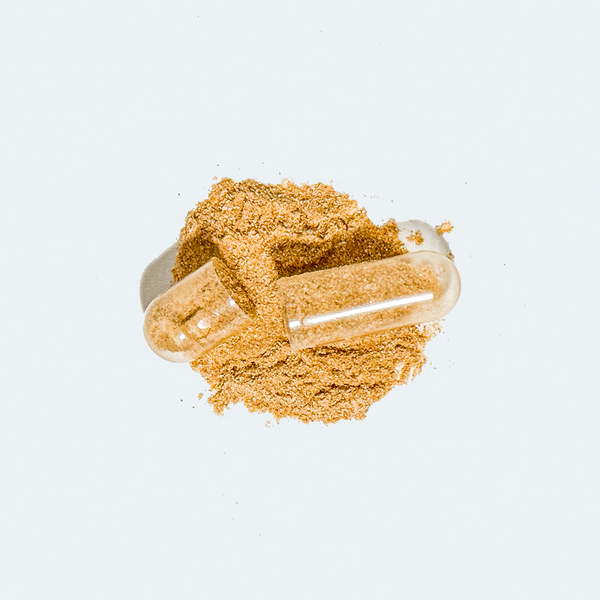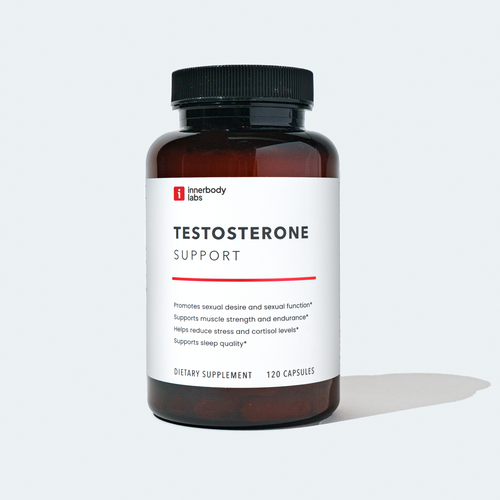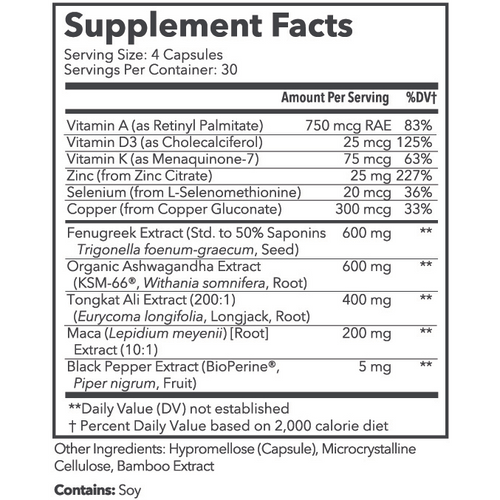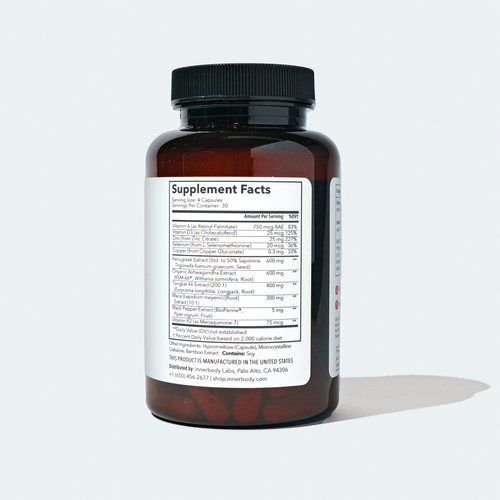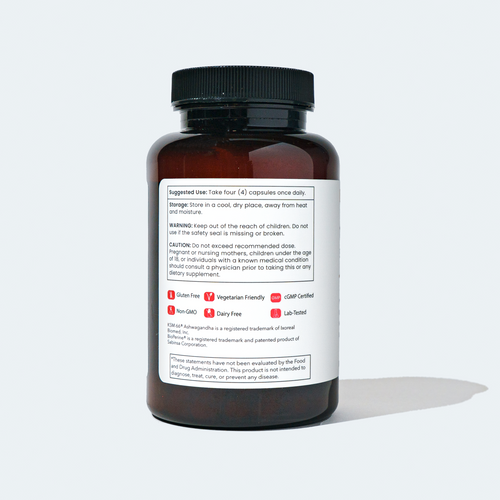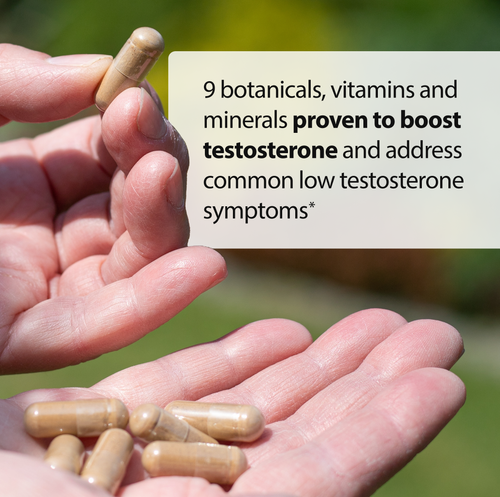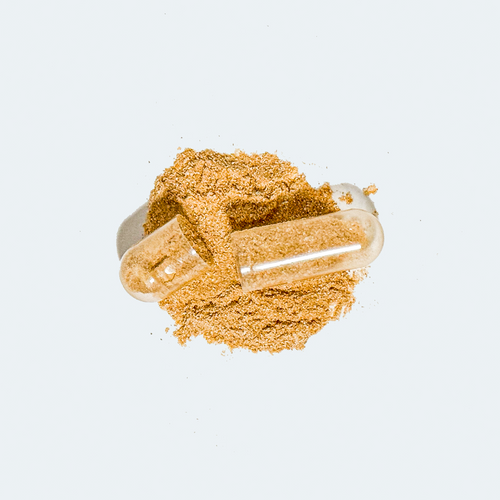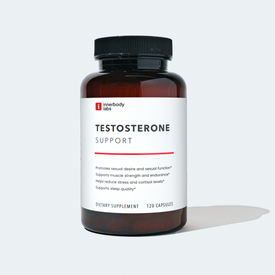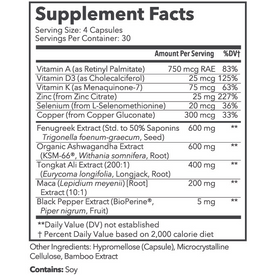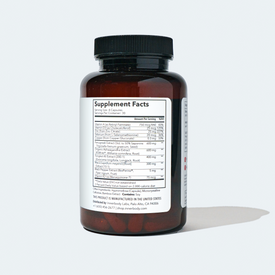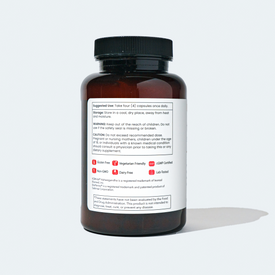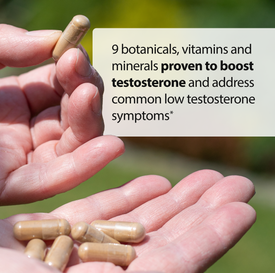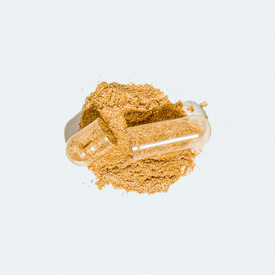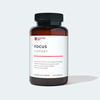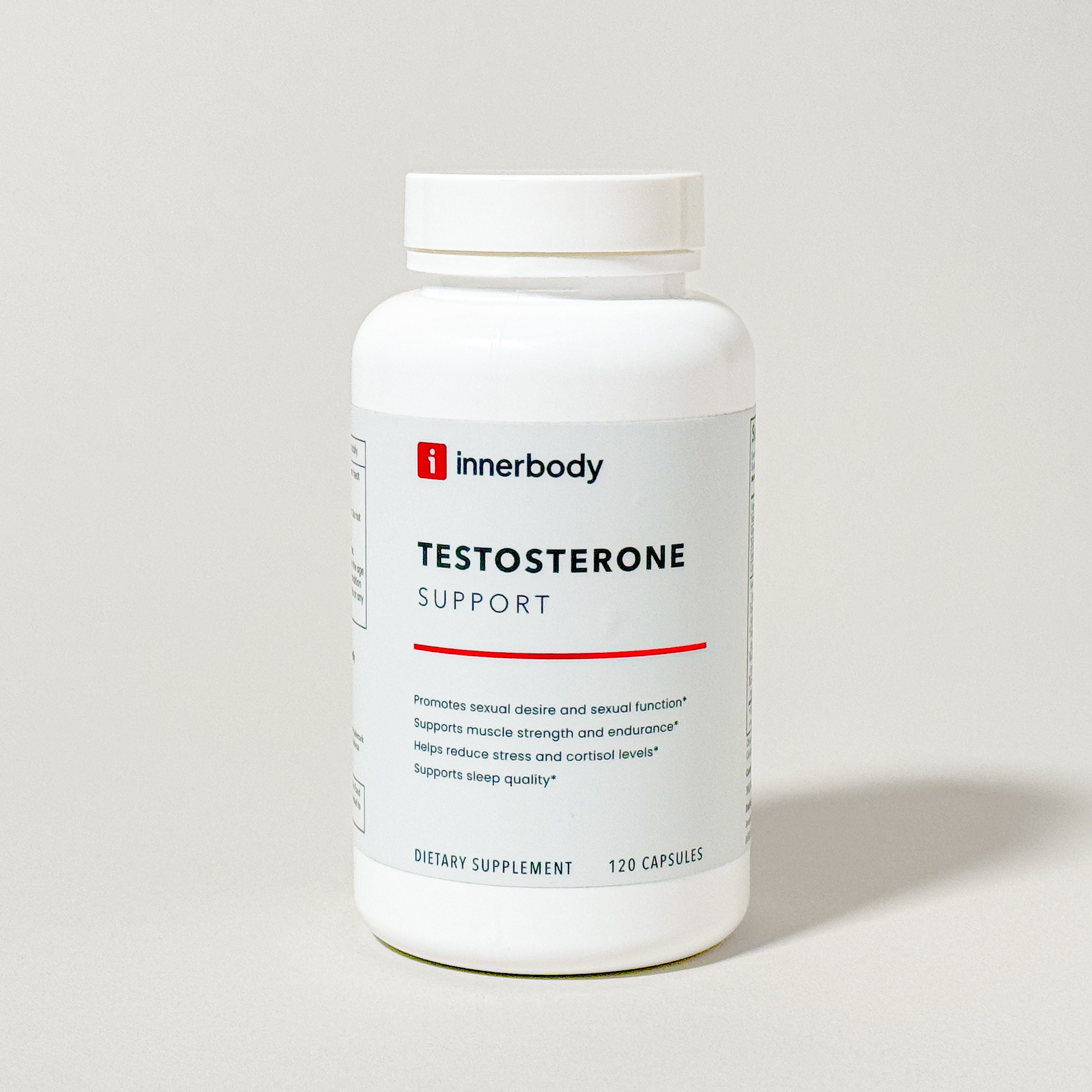A synergistic approach to naturally boost testosterone
Testosterone Support
Testosterone Support
Couldn't load pickup availability
Pairs best with
Key Ingredients
- Vitamin A
- Vitamin D3
- Zinc
- Selenium
- Copper
- Fenugreek Extract
- Tongkat Ali Extract
- Maca Root Extract
- Black Pepper Extract
- Vitamin K2
 Gluten-Free
Gluten-Free Vegetarian Friendly
Vegetarian Friendly Non-GMO
Non-GMO Paleo & Keto Friendly
Paleo & Keto Friendly
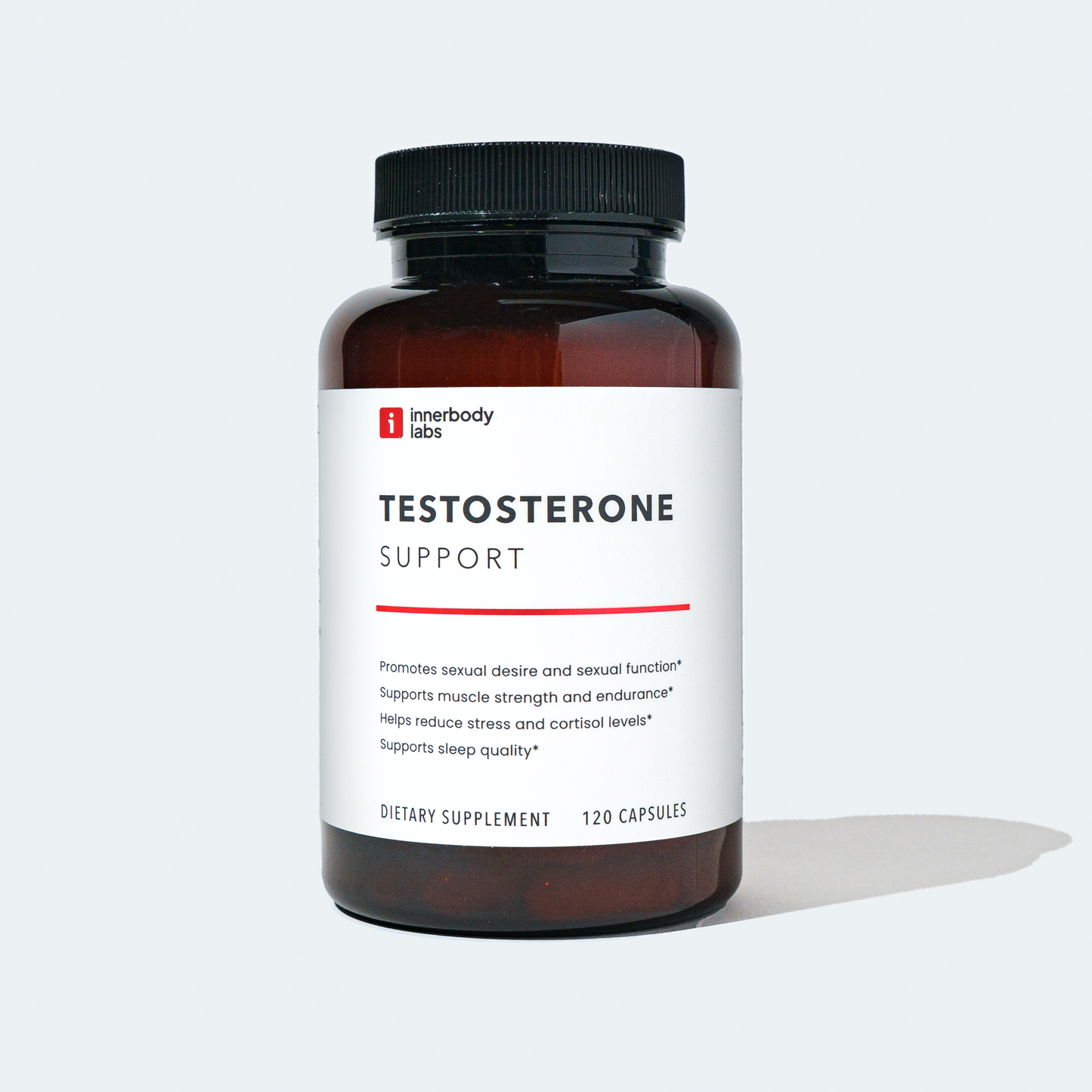
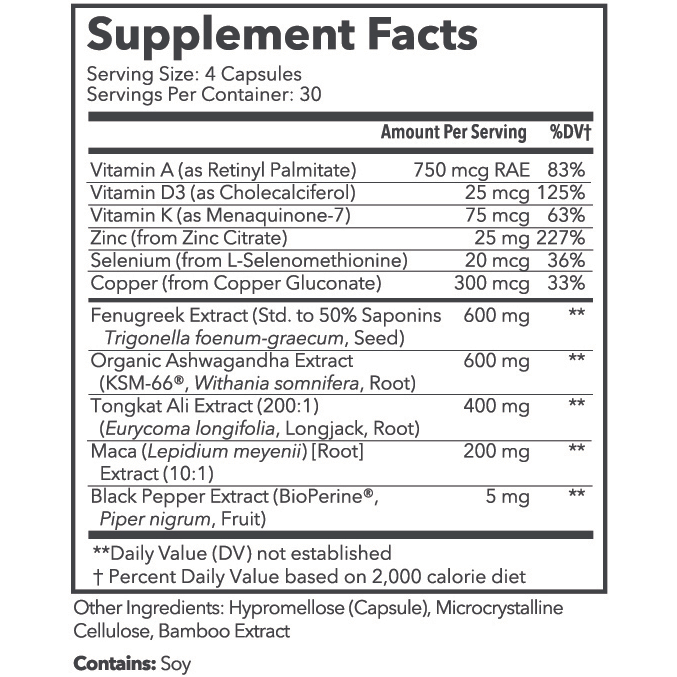
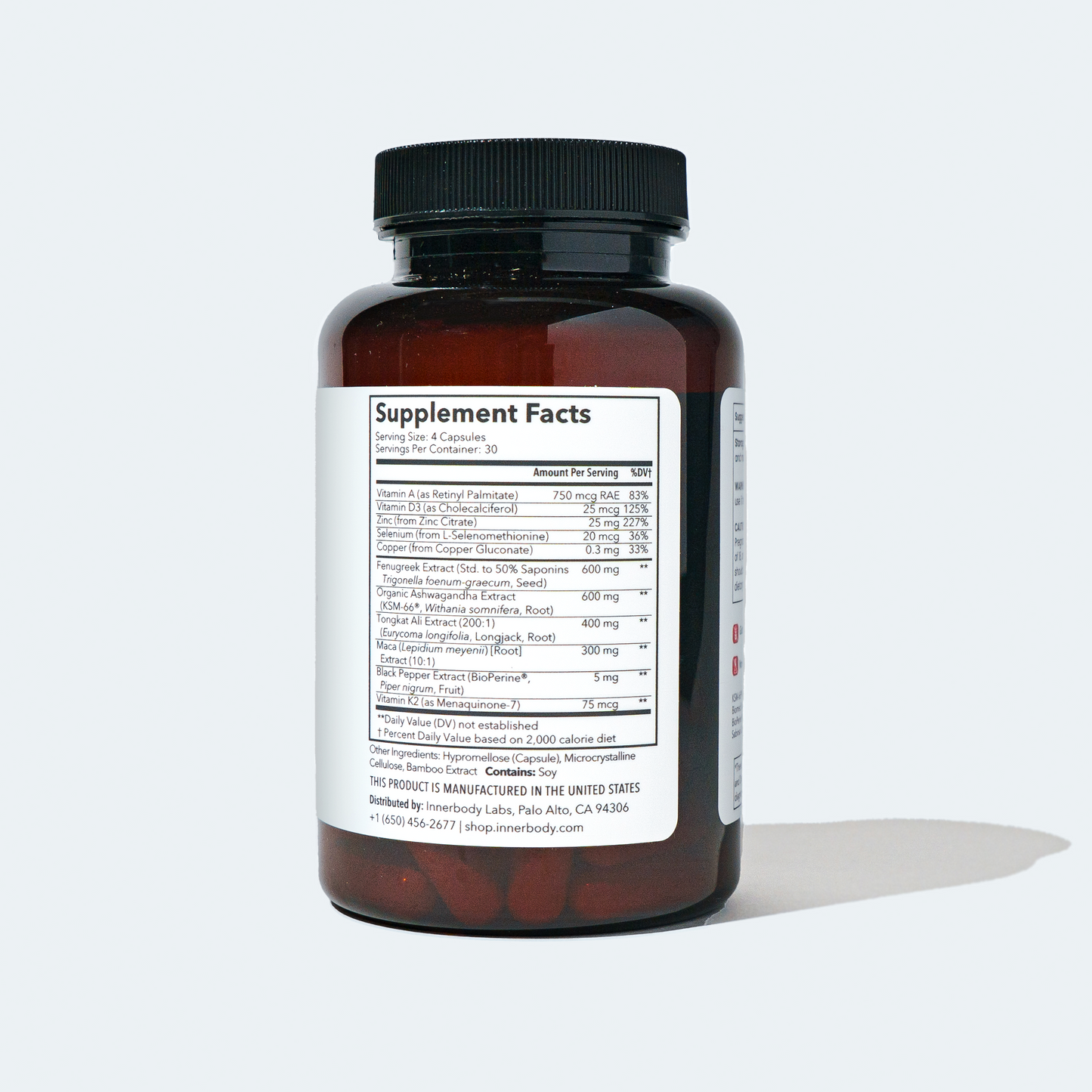
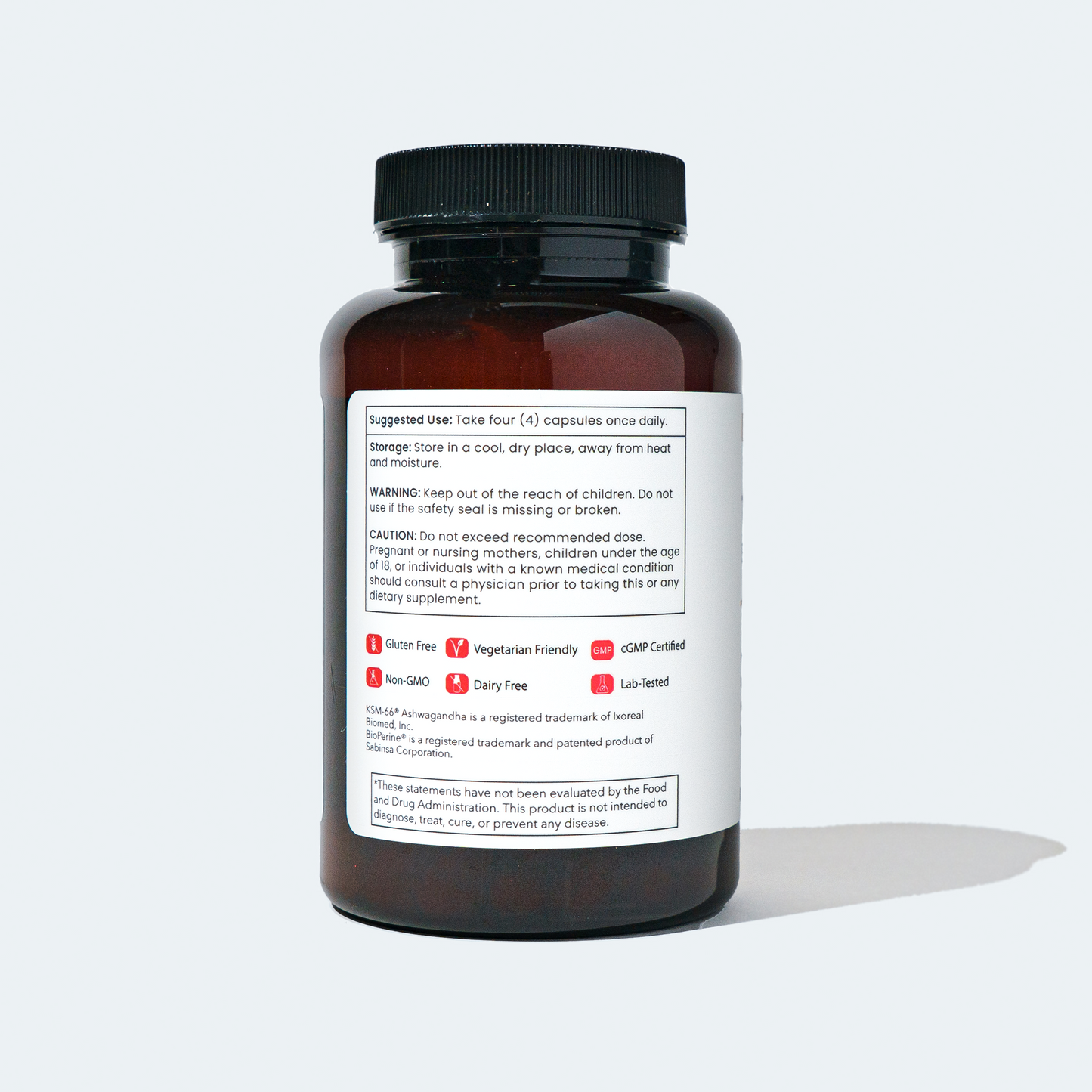
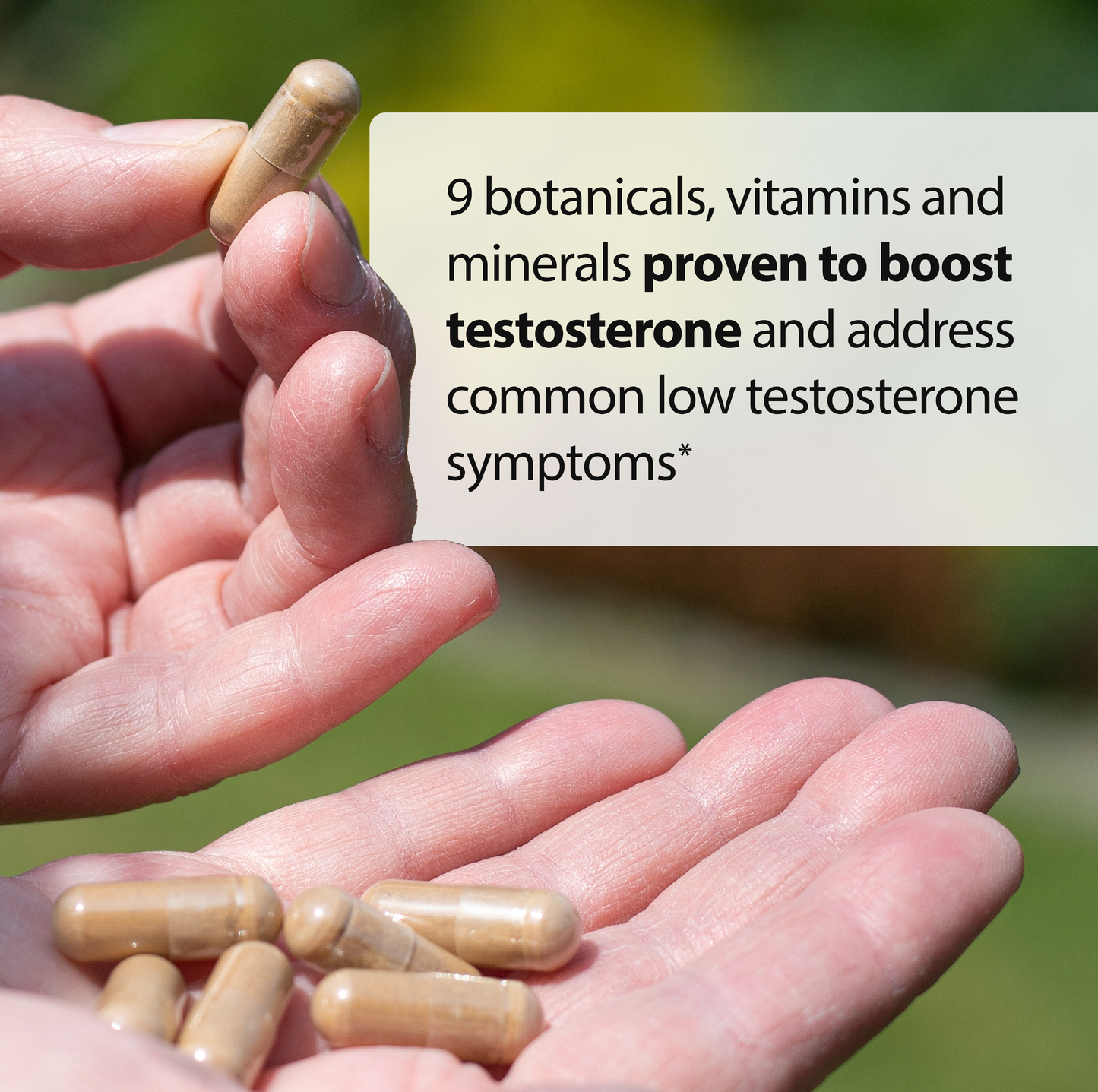
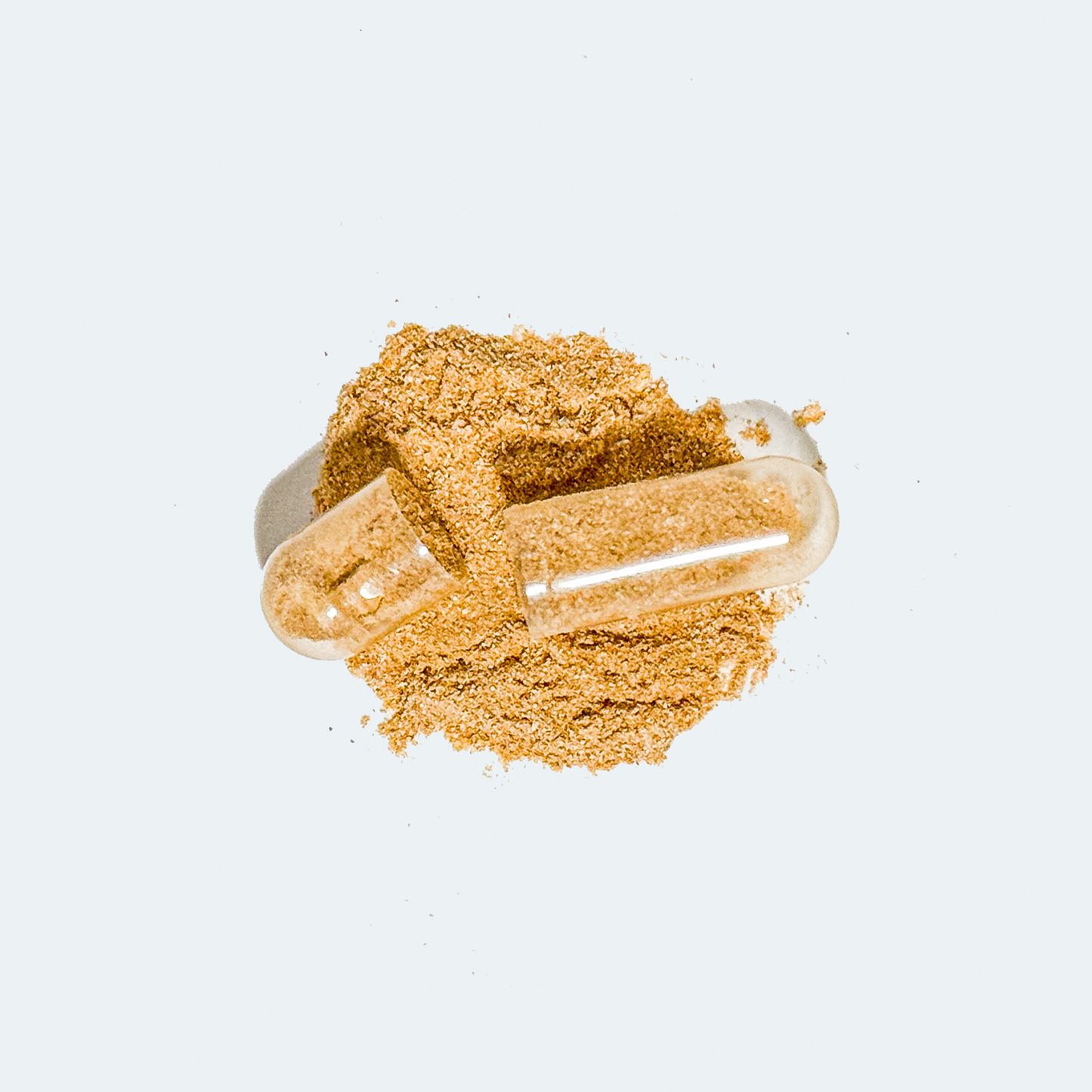
Testosterone Support
| Amount Per Serving | %DV | |
|---|---|---|
| Vitamin A (as Retinyl Palmitate) | 750 mcg | 83% |
| Vitamin D3 (as Cholecalciferol) | 25 mcg | 125% |
| Vitamin K2 (as Menaquinone-7) | 75 mcg | 63% |
| Zinc (from Citrate) | 25 mg | 227% |
| Selenium (from L-Selenomethionine) | 20 mcg | 36% |
| Copper (from Copper Gluconate) | 300 mcg | 33% |
| Fenugreek Extract (Std. to 50% Saponins) (Trigonella foenum-graecum, Seed) | 600 mg | ** |
| Organic Ashwagandha Extract (KSM-66®, Withania somnifera, Root) | 600 mg | ** |
| Tongkat Ali Extract (200:1) (Eurycoma longifolia, Longjack, Root) | 400 mg | ** |
| Maca (Lepidium meyenii) [Root] Extract (10:1) | 200 mg | ** |
| Black Pepper Extract (BioPerine®, Piper nigrum, Fruit) | 5 mg | ** |
What customers are saying
Amazing product renewed engery and strength along with weight loss
Celestino M.
Verified BuyerThis item really worth it
Steven B.
Verified BuyerThis is a great product. I received it damaged, and they sent me another one free of charge. And I do feel more energetic!
Larry H.
Verified Buyerbeen taking for 2 months and have noticed improvements
Lance L.
Verified BuyerSee What We Included And Why
| Amount Per Serving | %DV | |
|---|---|---|
| Vitamin A (as Retinyl Palmitate) | 750 mcg | 83% |
| Vitamin D3 (as Cholecalciferol) | 25 mcg | 125% |
| Vitamin K2 (as Menaquinone-7) | 75 mcg | 63% |
| Zinc (from Citrate) | 25 mg | 227% |
| Selenium (from L-Selenomethionine) | 20 mcg | 36% |
| Copper (from Copper Gluconate) | 300 mcg | 33% |
| Fenugreek Extract (Std. to 50% Saponins) (Trigonella foenum-graecum, Seed) | 600 mg | ** |
| Organic Ashwagandha Extract (KSM-66®, Withania somnifera, Root) | 600 mg | ** |
| Tongkat Ali Extract (200:1) (Eurycoma longifolia, Longjack, Root) | 400 mg | ** |
| Maca (Lepidium meyenii) [Root] Extract (10:1) | 200 mg | ** |
| Black Pepper Extract (BioPerine®, Piper nigrum, Fruit) | 5 mg | ** |
| Amount Per Serving | %DV | |
|---|---|---|
| Vitamin A (as Retinyl Palmitate) | 750 mcg | 83% |
| Vitamin D3 (as Cholecalciferol) | 25 mcg | 125% |
| Vitamin K2 (as Menaquinone-7) | 75 mcg | 63% |
| Zinc (from Citrate) | 25 mg | 227% |
| Selenium (from L-Selenomethionine) | 20 mcg | 36% |
| Copper (from Copper Gluconate) | 300 mcg | 33% |
| Fenugreek Extract (Std. to 50% Saponins) (Trigonella foenum-graecum, Seed) | 600 mg | ** |
| Organic Ashwagandha Extract (KSM-66®, Withania somnifera, Root) | 600 mg | ** |
| Tongkat Ali Extract (200:1) (Eurycoma longifolia, Longjack, Root) | 400 mg | ** |
| Maca (Lepidium meyenii) [Root] Extract (10:1) | 200 mg | ** |
| Black Pepper Extract (BioPerine®, Piper nigrum, Fruit) | 5 mg | ** |
See What We Included And Why
Improve testosterone and VO2Max while reducing anxiety*
In clinical trials, ashwagandha increases testosterone in men while profoundly reducing stress and anxiety. KSM-66® is especially potent, with a high concentration of the botanical’s active compounds. We include 600mg because compelling clinical research has shown the effectiveness of KSM-66® using that specific dose. In just two months, studies demonstrate that it can:
Improve testicular function*
Vitamin A was central to a decades-long study examining how lifestyle and nutrition can influence testosterone levels. It’s abundant in foods, but we still included nearly 85% of your daily value to ensure that it can:
Increase strength, power, and testosterone levels*
Multiple studies have not only drawn a direct correlation between low vitamin D levels and low testosterone, but also revealed that supplementing improves both vitamin D and testosterone levels. The 1,000 IU we provide here has been shown to:
Support testosterone production at the genetic level*
While some ingredients influence the testes or Leydig cells toward increasing testosterone, it appears that K2 holds sway over your very genes, pushing them toward better testosterone production. Our 75mcg dose can:
Boost immunity, sperm health, and T levels*
Research dating back decades shows an undeniable link between zinc and testosterone, as well as other vital health stats. With nearly 1 in 10 men in the U.S. at risk for a zinc deficiency, our 25mg dose helps safeguard your healthy zinc levels. Studies show it can:
Support fertility and sperm morphology*
A critical trace mineral, selenium is integral to the health and maintenance of male fertility, acting as an antioxidant and protector against environmental toxicity. It’s abundant in meats, dairy, beans, nuts, and seeds, and our 20mcg dose is sufficient to ensure you avoid deficiency. At healthy levels, selenium can:
Prevent copper depletion*
Zinc supplementation is critical for maintaining testosterone levels, but it can cause a depletion in copper. Our formula ensures your copper levels remain in a healthy range. It can also help support a fitness regimen by:
Double free testosterone*
More than just total testosterone, fenugreek can increase free testosterone — the version your body can actually use for things like muscle growth and sexual wellbeing. Our 600mg dose is standardized to 50% saponins. In 6-8 weeks, studies show that this dosage and strength can:
Improve testosterone and erectile performance*
Also known as longjack, this botanical provides a boost in both testosterone and erectile performance at just 200mg. Our dose is double that. Its highlights include:
Enhance libido, erectile health, and sexual confidence*
While maca has been shown to improve symptoms in men with hypogonadism, its erectile benefits are even better documented. Our potent 10:1 extract provides an equivalent of 2,000mg maca powder, which can:
Ensure nutrient absorption*
It’s hard for the body to absorb all the ingredients in a supplement, but black pepper extract has been shown to increase absorption. This ensures you get more of the effect you want.
Supported by clinical research
Double free testosterone and increase athletic performance*
FenugreekBoost testosterone and erectile performance while preventing zinc-induced copper deficiency*
Zinc + CopperEnhance libido while improving erectile health and boosting sexual confidence*
MacaImprove strength and T levels, affect genetic T expression, and stop D3-related calcium deposits.*
Vitamins D3 + K2- Ziegenfuss, T. N., Kedia, A. W., Sandrock, J. E., Raub, B. J., Kerksick, C. M., & Lopez, H. L. (2018). Effects of an Aqueous Extract of Withania somnifera on Strength Training Adaptations and Recovery: The STAR Trial. Nutrients, 10(11), 1807.
- Wankhede, S., Langade, D., Joshi, K., Sinha, S. R., & Bhattacharyya, S. (2015). Examining the effect of Withania somnifera supplementation on muscle strength and recovery: A randomized controlled trial. Journal of the International Society of Sports Nutrition, 12.
- Chauhan, S., Srivastava, M. K., & Pathak, A. K. (2022). Effect of standardized root extract of ashwagandha (Withania somnifera) on well-being and sexual performance in adult males: A randomized controlled trial. Health Science Reports, 5(4).
- Verma, N., Gupta, S. K., Tiwari, S., Mishra, A. K., Thakare, V., & Patil, S. (2023). Effect of Ashwagandha Root Extract on Serum Testosterone and Muscle Recovery in Strength Training. International Journal of Medical and Pharmaceutical Research, 4(5), 371-381.
- Lopresti, A. L., Drummond, P. D., & Smith, S. J. (2019). A Randomized, Double-Blind, Placebo-Controlled, Crossover Study Examining the Hormonal and Vitality Effects of Ashwagandha (Withania somnifera) in Aging, Overweight Males. American Journal of Men's Health.
- Lopresti, A. L., Smith, S. J., Malvi, H., & Kodgule, R. (2019). An investigation into the stress-relieving and pharmacological actions of an ashwagandha (Withania somnifera) extract: A randomized, double-blind, placebo-controlled study. Medicine, 98(37).
- Ahmad, M. K., Mahdi, A. A., Shukla, K. K., Islam, N., Rajender, S., Madhukar, D., Shankhwar, S. N., & Ahmad, S. (2010). Withania somnifera improves semen quality by regulating reproductive hormone levels and oxidative stress in seminal plasma of infertile males. Fertility and Sterility, 94(3), 989-996.
- Gupta, A., Mahdi, A. A., Shukla, K. K., Ahmad, M. K., Bansal, N., Sankhwar, P., & Sankhwar, S. N. (2013). Efficacy of Withania somnifera on seminal plasma metabolites of infertile males: A proton NMR study at 800 MHz. Journal of Ethnopharmacology, 149(1), 208-214.
- Andrade, C., Aswath, A., Chaturvedi, S. K., Srinivasa, M., & Raguram, R. (2000). A double-blind, placebo-controlled evaluation of the anxiolytic efficacy of an ethanolic extract of Withania somnifera. Indian Journal of Psychiatry, 42(3), 295-301.
- Sud, K. S., & Thaker, A. B. (Year). A Randomized Double Blind Placebo Controlled Study of Ashwagandha on Generalized Anxiety Disorder. International Ayurvedic Medical Journal, 1(5)
- Sandhu, J. S., Shah, B., Shenoy, S., Chauhan, S., Lavekar, G. S., & Padhi, M. M. (2010). Effects of Withania somnifera (Ashwagandha) and Terminalia arjuna (Arjuna) on physical performance and cardiorespiratory endurance in healthy young adults. International Journal of Ayurveda Research, 1(3), 144-149.
- Shenoy, S., Chaskar, U., Sandhu, J. S., & Paadhi, M. M. (2012). Effects of eight-week supplementation of Ashwagandha on cardiorespiratory endurance in elite Indian cyclists. Journal of Ayurveda and Integrative Medicine, 3(4), 209-214.
- Malik, A., Mehta, V., Dahiya, V. (2013). Effect of Ashwagandha (Withania somnifera) Root Powder on the VO2 Max and Hemoglobin in Hockey Players. International Journal of Behavioral Social and Movement Sciences, 2(3).
- Choudhary, B., Shetty, A., & Langade, D. G. (2015). Efficacy of Ashwagandha (Withania somnifera [L.] Dunal) in improving cardiorespiratory endurance in healthy athletic adults. Ayu, 36(1), 63-68.
- RK, T., BA, S., AU, P., AA, R., & NN, R. (2016). Effect of Withania somnifera on physical and cardiovascular performance induced by physical stress in healthy human volunteers. International Journal of Basic & Clinical Pharmacology, 5(6), 2510–2516.
- Deshpande, A., Irani, N., Balkrishnan, R., & Benny, I. R. (2020). A randomized, double blind, placebo controlled study to evaluate the effects of ashwagandha (Withania somnifera) extract on sleep quality in healthy adults. Sleep medicine, 72, 28–36.
- Langade, D., Kanchi, S., Salve, J., Debnath, K., & Ambegaokar, D. (2019). Efficacy and Safety of Ashwagandha (Withania somnifera) Root Extract in Insomnia and Anxiety: A Double-blind, Randomized, Placebo-controlled Study. Cureus, 11(9).
- Choudhary, D., Bhattacharyya, S., & Joshi, K. (2016). Body Weight Management in Adults Under Chronic Stress Through Treatment With Ashwagandha Root Extract. Journal of Evidence-Based Complementary & Alternative Medicine.
- Kelgane, S. B., Salve, J., Sampara, P., & Debnath, K. (2020). Efficacy and Tolerability of Ashwagandha Root Extract in the Elderly for Improvement of General Well-being and Sleep: A Prospective, Randomized, Double-blind, Placebo-controlled Study. Cureus, 12(2).
- Pingali, U., Pilli, R., & Fatima, N. (2014). Effect of standardized aqueous extract of Withania somnifera on tests of cognitive and psychomotor performance in healthy human participants. Pharmacognosy Research, 6(1), 12-18.
- Wankhede, S., Mohan, V., & Thakurdesai, P. (2016). Beneficial effects of fenugreek glycoside supplementation in male subjects during resistance training: A randomized controlled pilot study. Journal of Sport and Health Science, 5(2), 176-182.
- Poole, C., Bushey, B., Foster, C., Campbell, B., Willoughby, D., Kreider, R., Taylor, L., & Wilborn, C. (2010). The effects of a commercially available botanical supplement on strength, body composition, power output, and hormonal profiles in resistance-trained males. Journal of the International Society of Sports Nutrition, 7, 34.
- Taylor, L., Poole, C., Pena, E., Lewing, M., Kreider, R., Foster, C., & Wilborn, C. (2011). Effects of Combined Creatine Plus Fenugreek Extract vs. Creatine Plus Carbohydrate Supplementation on Resistance Training Adaptations. Journal of Sports Science & Medicine, 10(2), 254-260.
- Goh, J., Menke, W., Herrick, L. P., Campbell, M. S., Abel, M. G., Fleenor, B. S., & Bergstrom, H. C. (2020). Examination of Curcumin and Fenugreek Soluble Fiber Supplementation on Submaximal and Maximal Aerobic Performance Indices. Journal of Functional Morphology and Kinesiology, 5(2).
- Ruby, B. C., Gaskill, S. E., Slivka, D., & Harger, S. G. (2005). The addition of fenugreek extract (Trigonella foenum-graecum) to glucose feeding increases muscle glycogen resynthesis after exercise. Amino Acids, 28(1), 71–76.
- Slivka, D., Cuddy, J., Hailes, W., Harger, S., & Ruby, B. (2008). Glycogen resynthesis and exercise performance with the addition of fenugreek extract (4-hydroxyisoleucine) to post-exercise carbohydrate feeding. Amino Acids, 35(2), 439–444.
- Hassani, S. S., Arezodar, F. F., Esmaeili, S. S., & Gholami-Fesharaki, M. (2019). Effect of Fenugreek Use on Fasting Blood Glucose, Glycosylated Hemoglobin, Body Mass Index, Waist Circumference, Blood Pressure and Quality of Life in Patients with Type 2 Diabetes Mellitus: A Randomized, Double-Blinded, Placebo-Controlled Clinical Trials. Galen Medical Journal, 8, e1432.
- Kiss, R., Szabó, K., Gesztelyi, R., Somodi, S., Kovács, P., Szabó, Z., Németh, J., Priksz, D., Kurucz, A., Juhász, B., & Szilvássy, Z. (2018). Insulin-Sensitizer Effects of Fenugreek Seeds in Parallel with Changes in Plasma MCH Levels in Healthy Volunteers. International Journal of Molecular Sciences, 19(3).
- Gaddam, A., Galla, C., Thummisetti, S., Marikanty, R. K., Palanisamy, U. D., & Rao, P. V. (2015). Role of Fenugreek in the prevention of type 2 diabetes mellitus in prediabetes. Journal of Diabetes and Metabolic Disorders, 14.
- Guo, R., Wang, Q., Nair, R.P., Barnes, S.L., Smith, D.T., Dai, B., Robinson, T.J., & Nair, S. (2018). Furosap, a novel Fenugreek seed extract improves lean body mass and serum testosterone in a randomized, placebo-controlled, double-blind clinical investigation. Functional Foods in Health and Disease. 7(4)
- G, S., G L, S., Pushpan, C. K., Nambisan, B., & A, H. (2018). Evaluation of anti-arthritic potential of Trigonella foenum graecum L. (Fenugreek) mucilage against rheumatoid arthritis. Prostaglandins & Other Lipid Mediators, 138, 48–53.
- Pundarikakshudu, K., Shah, D. H., Panchal, A. H., & Bhavsar, G. C. (2016). Anti-inflammatory activity of fenugreek (Trigonella foenum-graecum Linn) seed petroleum ether extract.Indian Journal of Pharmacology, 48(4), 441-444.
- M. Tambi, I. B., Imran, M. K., & Henkel, R. R. (2011). Standardised water-soluble extract of Eurycoma longifolia, Tongkat ali, as testosterone booster for managing men with late-onset hypogonadism? Andrologia, 44, 226-230.
- Henkel, R. R., Wang, R., Bassett, S. H., Chen, T., Liu, N., Zhu, Y., & Tambi, M. I. (2014). Tongkat Ali as a Potential Herbal Supplement for Physically Active Male and Female Seniors—A Pilot Study. Phytotherapy Research, 28(4), 544-550.
- Talbott, S. M., Talbott, J. A., George, A., & Pugh, M. (2013). Effect of Tongkat Ali on stress hormones and psychological mood state in moderately stressed subjects. Journal of the International Society of Sports Nutrition, 10, 28.
- Hamzah, S.H. & Yusof, A. (2003). The Ergogenic Effect of Eurycoma longifolia Jack: A Pilot Study. Joint Conference of BASEMand BASES, 37, 464-470
- Leitão, A. E., Vieira, M. C. S., Pelegrini, A., da Silva, E. L., & Guimarães, A. C. A. (2021). A 6-month, double-blind, placebo-controlled, randomized trial to evaluate the effect of Eurycoma longifolia (Tongkat Ali) and concurrent training on erectile function and testosterone levels in androgen deficiency of aging males (ADAM). Maturitas, 145, 78–85.
- Kotirum, S., Ismail, S. B., & Chaiyakunapruk, N. (2015). Efficacy of Tongkat Ali (Eurycoma longifolia) on erectile function improvement: Systematic review and meta-analysis of randomized controlled trials. Complementary Therapies in Medicine, 23(5), 693-698.
- Ismail, S. B., Zahiruddin Wan Mohammad, W. M., George, A., Nik Hussain, N. H., Musthapa Kamal, Z. M., & Liske, E. (2012). Randomized Clinical Trial on the Use of PHYSTA Freeze-Dried Water Extract of Eurycoma longifolia for the Improvement of Quality of Life and Sexual Well-Being in Men. Evidence-Based Complementary and Alternative Medicine : ECAM, 2012.
- Chinnappan, S. M., George, A., Pandey, P., Narke, G., & Choudhary, Y. K. (2021). Effect of Eurycoma longifolia standardised aqueous root extract–Physta® on testosterone levels and quality of life in ageing male subjects: A randomised, double-blind, placebo-controlled multicentre study. Food & Nutrition Research, 65.
- Chan, K. Q., Stewart, C., Chester, N., Hamzah, S. H., & Yusof, A. (2021). The effect of Eurycoma Longifolia on the regulation of reproductive hormones in young males. Andrologia, 53(4), e14001.
- Badmaev, V., Majeed, M., & Prakash, L. (2000). Piperine derived from black pepper increases the plasma levels of coenzyme Q10 following oral supplementation. The Journal of Nutritional Biochemistry, 11(2), 109–113.
- Shoba, G., Joy, D., Joseph, T., Majeed, M., Rajendran, R., & Srinivas, P. S. (1998). Influence of piperine on the pharmacokinetics of curcumin in animals and human volunteers. Planta Medica, 64(4), 353–356.
- Córdova Martínez, A. (2020). Iron and Physical Activity: Bioavailability Enhancers, Properties of Black Pepper (Bioperine®) and Potential Applications. Nutrients, 12(6), 1886.
- Mhaske, D. B., Sreedharan, S., & Mahadik, K. R. (2018). Role of Piperine as an Effective Bioenhancer in Drug Absorption. Pharmaceutica Analytica Acta, 9(7), 591.
- Jin, J., & Han, K. (2010). Effect of Piperine, a Major Component of Black Pepper, on the Intestinal Absorption of Fexofenadine and Its Implication on Food–Drug Interaction. Journal of Food Science, 75(3), H93-H96
- Izgelov, D., Domb, A. J., & Hoffman, A. (2020). The effect of piperine on oral absorption of cannabidiol following acute vs. Chronic administration. European Journal of Pharmaceutical Sciences, 148, 105313.
- Appling, D. R., & Chytil, F. (1981). Evidence of a role for retinoic acid (vitamin A-acid) in the maintenance of testosterone production in male rats. Endocrinology, 108(6), 2120–2124.
- Huang, H. F., Dyrenfurth, I., & Hembree, W. C. (1983). Endocrine changes associated with germ cell loss during vitamin A-induced recovery of spermatogenesis. Endocrinology, 112(4), 1163–1171.
- Livera, G., Rouiller-Fabre, V., Pairault, C., Levacher, C., & Habert, R. (2002). Regulation and perturbation of testicular functions by vitamin A. Reproduction (Cambridge, England), 124(2), 173–180.
- Tucci, P., Cione, E. & Genchi, G. (2008). Retinoic acid-induced testosterone production and retinoylation reaction are concomitant and exhibit a positive correlation in Leydig (TM-3) cells. J Bioenerg Biomembr 40, 111–115.
- Jutley, J. K., Reaney, S., Kelleher, J., & Whelan, P. (1990). Interactions of retinoic acid and androgens in human prostatic tissue. The Prostate, 16(4), 299-304.
- Yang, Y., Luo, J., Yu, D., Zhang, T., Lin, Q., Li, Q., Wu, X., Su, Z., Zhang, Q., Xiang, Q., & Huang, Y. (2018). Vitamin A Promotes Leydig Cell Differentiation via Alcohol Dehydrogenase 1. Frontiers in Endocrinology, 9.
- Oluboyo, A. O., Adijeh, R. U., Onyenekwe, C. C., Oluboyo, B. O., Mbaeri, T. C., Odiegwu, C. N., Chukwuma, G. O., & Onwuasoanya, U. F. (2012). Relationship between serum levels of testosterone, zinc and selenium in infertile males attending fertility clinic in Nnewi, south east Nigeria. African Journal of Medicine and Medical Sciences, 41 Suppl, 51–54.
- Pieczyńska, J., & Grajeta, H. (2015). The role of selenium in human conception and pregnancy. Journal of Trace Elements in Medicine and Biology, 29, 31-38.
- Al-Jawad, Z. & Al-fahham, A. (2021). The Effect of Ascorbic Acid and Selenium intake on serum Cortisol in Rats Under Restraint Stress. Indian Journal of Forensic Medicine & Toxicology. 15. 1681-1685. 10.37506/ijfmt.v15i1.13651.
- Watanabe, T., & Endo, A. (1991). Effects of selenium deficiency on sperm morphology and spermatocyte chromosomes in mice. Mutation Research Letters, 262(2), 93-99.
- Lukusa, K., & Lehloenya, K. (2017). Selenium supplementation improves testicular characteristics and semen quality of Saanen bucks. Small Ruminant Research, 151, 52-58.
- Ghorbani, A., Moeini, M. M., Souri, M., & Hajarian, H. (2017). Influences of dietary selenium, zinc and their combination on semen characteristics and testosterone concentration in mature rams during breeding season. Journal of Applied Animal Research, 46(1), 813–819.
- Shi, L., Song, R., Yao, X., Duan, Y., Ren, Y., Zhang, C., Yue, W., & Lei, F. (2018). Effects of maternal dietary selenium (Se-enriched yeast) on testis development, testosterone level and testicular steroidogenesis-related gene expression of their male kids in Taihang Black Goats. Theriogenology, 114, 95-102.
- Wang, S., Gu, X., Ma, J., Gu, Z., Zhang, R., Li, R., Bai, J., Li, P., Wei, L., Ye, Y., Wang, Y., Zhang, L., Su, L., & Liang, C. (2023). Selenium nanoparticles improve nickel-induced testosterone synthesis disturbance by down-regulating miR-708-5p/p38 MAPK pathway in Leydig cells. Environmental Toxicology, 38(8), 1846–1859.
- Ghafarizadeh, A. A., Vaezi, G., Shariatzadeh, M. A., & Malekirad, A. A. (2018). Effect of in vitro selenium supplementation on sperm quality in asthenoteratozoospermic men. Andrologia, 50(2), e12869.
- Hunt, C. D., Johnson, P. E., Herbel, J., & Mullen, L. K. (1992). Effects of dietary zinc depletion on seminal volume and zinc loss, serum testosterone concentrations, and sperm morphology in young men. The American journal of clinical nutrition, 56(1), 148–157.
- Prasad, A. S., Abbasi, A. A., Rabbani, P., & Dumouchelle, E. (1981). Effect of zinc supplementation on serum testosterone level in adult male sickle cell anemia subjects. American Journal of Hematology, 10(2), 119-127.
- Liu, L., Zhang, N., Tong, Y., Sun, Y., Zhu, H., Cao, Y., Zhang, J., Huang, H., Niu, B., Li, H., Guo, H., Gao, Y., Zhu, L., & Li, Y. (2017). The effectiveness of zinc supplementation in men with isolated hypogonadotropic hypogonadism. Asian Journal of Andrology, 19(3), 280-285.
- Chu, D. S. (2018). Zinc: A small molecule with a big impact on sperm function. PLoS Biology, 16(6).
- Fallah, A., Mohammad-Hasani, A., & Colagar, A. H. (2018). Zinc is an Essential Element for Male Fertility: A Review of Zn Roles in Men’s Health, Germination, Sperm Quality, and Fertilization. Journal of Reproduction & Infertility, 19(2), 69-81.
- Colagar, A. H., Marzony, E. T., & Chaichi, M. J. (2009). Zinc levels in seminal plasma are associated with sperm quality in fertile and infertile men. Nutrition Research (New York, N.Y.), 29(2), 82–88.
- Kilic, M., Baltaci, A. K., Gunay, M., Gökbel, H., Okudan, N., & Cicioglu, I. (2006). The effect of exhaustion exercise on thyroid hormones and testosterone levels of elite athletes receiving oral zinc. Neuro Endocrinology Letters, 27(1-2), 247–252.
- Prasad, A. S., Mantzoros, C. S., Beck, F. W., Hess, J. W., & Brewer, G. J. (1996). Zinc status and serum testosterone levels of healthy adults. Nutrition (Burbank, Los Angeles County, Calif.), 12(5), 344–348
- Netter, A., Hartoma, R., & Nahoul, K. (1981). Effect of zinc administration on plasma testosterone, dihydrotestosterone, and sperm count. Archives of Andrology, 7(1), 69–73.
- Cinar, V., Talaghir, L.G., Akbulut, T., Turgut, M., Sarikaya, M. (2018). The effects of the zinc supplementation and weight trainings on the testosterone levels. Human.Sport.Medicine. 17. 58-63. 10.14529/hsm170407.
- Hoffman, H. N., Phyliky, R. L., & Fleming, C. (1988). Zinc-induced copper deficiency. Gastroenterology, 94(2), 508-512.
- Chang, C. S., Choi, J. B., Kim, H. J., & Park, S. B. (2011). Correlation between serum testosterone level and concentrations of copper and zinc in hair tissue. Biological Trace Element Research, 144(1-3), 264–271.
- Duncan A, Yacoubian C, Watson N, and Morrison, I. (2015). The risk of copper deficiency in patients prescribed zinc supplements. Journal of Clinical Pathology 2015;68:723-725.
- Willis, M. S., Monaghan, S. A., Miller, M. L., McKenna, R. W., Perkins, W. D., Levinson, B. S., Bhushan, V., & Kroft, S. H. (2005). Zinc-Induced Copper Deficiency: A Report of Three Cases Initially Recognized on Bone Marrow Examination. American Journal of Clinical Pathology, 123(1), 125-131.
- Nishime, K., Kondo, M., Saito, K., Miyawaki, H., & Nakagawa, T. (2020). Zinc Burden Evokes Copper Deficiency in the Hypoalbuminemic Hemodialysis Patients. Nutrients, 12(2), 577.
- L'Abbé, M. R., & Fischer, P. W. (1984). The Effects of High Dietary Zinc and Copper Deficiency on the Activity of Copper-Requiring Metalloenzymes in the Growing Rat. The Journal of Nutrition, 114(5), 813-822.
- Gonzales, G. F., Cordova, A., Gonzales, C., Chung, A., Vega, K., & Villena, A. (2001). Lepidium meyenii (Maca) improved semen parameters in adult men. Asian journal of andrology, 3(4), 301–303.
- Gonzales, G. F., Córdova, A., Vega, K., Chung, A., Villena, A., Góñez, C., & Castillo, S. (2002). Effect of Lepidium meyenii (MACA) on sexual desire and its absent relationship with serum testosterone levels in adult healthy men. Andrologia, 34(6), 367–372.
- Stone, M., Ibarra, A., Roller, M., Zangara, A., & Stevenson, E. (2009). A pilot investigation into the effect of maca supplementation on physical activity and sexual desire in sportsmen. Journal of Ethnopharmacology, 126(3), 574–576.
- Zenico, T., Cicero, A. F., Valmorri, L., Mercuriali, M., & Bercovich, E. (2009). Subjective effects of Lepidium meyenii (Maca) extract on well-being and sexual performances in patients with mild erectile dysfunction: a randomised, double-blind clinical trial. Andrologia, 41(2), 95–99.
- Shin, D., Jeon, S. H., Piao, J., Park, H. J., Tian, W. J., Moon, D. G., Ahn, S. T., Jeon, H., Zhu, G. Q., Park, I., Park, J., Bae, W. J., Cho, H. J., Hong, H., & Kim, S. W. (2023). Efficacy and Safety of Maca (Lepidium meyenii) in Patients with Symptoms of Late-Onset Hypogonadism: A Randomized, Double-Blind, Placebo-Controlled Clinical Trial. The World Journal of Men's Health, 41(3), 692-700.
- Gonzales, C., Rubio, J., Gasco, M., Nieto, J., Yucra, S., & Gonzales, G. F. (2006). Effect of short-term and long-term treatments with three ecotypes of Lepidium meyenii (MACA) on spermatogenesis in rats. Journal of Ethnopharmacology, 103(3), 448-454.
- Zheng, B. L., He, K., Kim, C. H., Rogers, L., Shao, Y., Huang, Z. Y., Lu, Y., Yan, S. J., Qien, L. C., & Zheng, Q. Y. (2000). Effect of a lipidic extract from lepidium meyenii on sexual behavior in mice and rats. Urology, 55(4), 598–602.
- Cicero, A. F., Bandieri, E., & Arletti, R. (2001). Lepidium meyenii Walp. improves sexual behaviour in male rats independently from its action on spontaneous locomotor activity. Journal of Ethnopharmacology, 75(2-3), 225–229.
- Yoshida, K., Ohta, Y., Kawate, N., Takahashi, M., Inaba, T., Hatoya, S., Morii, H., Takahashi, K., Ito, M., & Tamada, H. (2018). Long-term feeding of hydroalcoholic extract powder of Lepidium meyenii (maca) enhances the steroidogenic ability of Leydig cells to alleviate its decline with ageing in male rats. Andrologia, 50(1), 10.1111/and.12803.
- Wehr, E., Pilz, S., Boehm, B. O., März, W., & Obermayer-Pietsch, B. (2010). Association of vitamin D status with serum androgen levels in men. Clinical Endocrinology, 73(2), 243-248.
- Lee, D. M., Tajar, A., Pye, S. R., Boonen, S., Vanderschueren, D., Bouillon, R., W, T., Bartfai, G., Casanueva, F. F., Finn, J. D., Forti, G., Giwercman, A., Han, T. S., Huhtaniemi, I. T., Kula, K., Lean, M. E., Pendleton, N., Punab, M., & Wu, F. C. (2012). Association of hypogonadism with vitamin D status: The European Male Ageing Study. European Journal of Endocrinology, 166(1), 77-85.
- Nimptsch, K., Platz, E. A., Willett, W. C., & Giovannucci, E. (2012). Association between plasma 25-OH vitamin D and testosterone levels in men. Clinical Endocrinology, 77(1), 106-112.
- Chin, K. Y., Ima-Nirwana, S., & Wan Ngah, W. Z. (2015). Vitamin D is significantly associated with total testosterone and sex hormone-binding globulin in Malaysian men. The Aging Male : The Official Journal of the International Society for the Study of the Aging Male, 18(3), 175–179.
- Laczmanski, L., Lwow, F., Mossakowska, M., Puzianowska-Kuznicka, M., Szwed, M., Kolackov, K., Krzyzanowska-Swiniarska, B., Bar-Andziak, E., Chudek, J., Sloka, N., & Milewicz, A. (2015). Association between vitamin D concentration and levels of sex hormones in an elderly Polish population with different genotypes of VDR polymorphisms (rs10735810, rs1544410, rs7975232, rs731236). Gene, 559(1), 73–76.
- Tak, Y. J., Lee, J. G., Kim, Y. J., Park, N. C., Kim, S. S., Lee, S., Cho, B. M., Kong, E. H., Jung, D. W., & Yi, Y. H. (2015). Serum 25-hydroxyvitamin D levels and testosterone deficiency in middle-aged Korean men: A cross-sectional study. Asian Journal of Andrology, 17(2), 324-328.
- Wang, N., Han, B., Li, Q., Chen, Y., Chen, Y., Xia, F., Lin, D., Jensen, M. D., & Lu, Y. (2015). Vitamin D is associated with testosterone and hypogonadism in Chinese men: Results from a cross-sectional SPECT-China study. Reproductive Biology and Endocrinology : RB&E, 13.
- Anic, G. M., Albanes, D., Rohrmann, S., Kanarek, N., Nelson, W. G., Bradwin, G., Rifai, N., McGlynn, K. A., Platz, E. A., & Mondul, A. M. (2016). Association between serum 25-hydroxyvitamin D and serum sex steroid hormones among men in NHANES. Clinical Endocrinology, 85(2), 258-266.
- Rafiq, R., van Schoor, N. M., Sohl, E., Zillikens, M. C., Oosterwerff, M. M., Schaap, L., Lips, P., & de Jongh, R. T. (2016). Associations of vitamin D status and vitamin D-related polymorphisms with sex hormones in older men. The Journal of Steroid Biochemistry and Molecular Biology, 164, 11–17.
- Tirabassi, G., Sudano, M., Salvio, G., Cutini, M., Muscogiuri, G., Corona, G., & Balercia, G. (2018). Vitamin D and Male Sexual Function: A Transversal and Longitudinal Study. International Journal of Endocrinology, 2018(1), 3720813.
- Pilz, S., Frisch, S., Koertke, H., Kuhn, J., Dreier, J., Obermayer-Pietsch, B., Wehr, E., & Zittermann, A. (2011). Effect of vitamin D supplementation on testosterone levels in men. Hormone and Metabolic Research, 43(3), 223–225.
- Masterjohn, C. (2007). Vitamin D toxicity redefined: Vitamin K and the molecular mechanism. Medical Hypotheses, 68(5), 1026-1034.
- Takumi, N., Shirakawa, H., Ohsaki, Y., Ito, A., Watanabe, T., Giriwono, P. E., Sato, T., & Komai, M. (2011). Dietary vitamin K alleviates the reduction in testosterone production induced by lipopolysaccharide administration in rat testis. Food & Function, 2(7), 406–411.
- Ho, H.-J., Shirakawa, H., & Komai, M. (2017). Menaquinone‐4 Enhances Steroidogenesis in Testis Derived Tumor Cells Via the Elevation of cAMP Level. InTech.
- Shirakawa, H., Ohsaki, Y., Minegishi, Y., Takumi, N., Ohinata, K., Furukawa, Y., Mizutani, T., & Komai, M. (2006). Vitamin K deficiency reduces testosterone production in the testis through down-regulation of the Cyp11a a cholesterol side chain cleavage enzyme in rats. Biochimica et Biophysica Acta (BBA) - General Subjects, 1760(10), 1482-1488.

Ashwagandha (KSM-66 ®)
Ashwagandha is an adaptogenic herb native to India and North Africa, traditionally used in Ayurvedic medicine to help the body manage stress. In clinical trials, ashwagandha increases testosterone in men while profoundly reducing stress and anxiety.
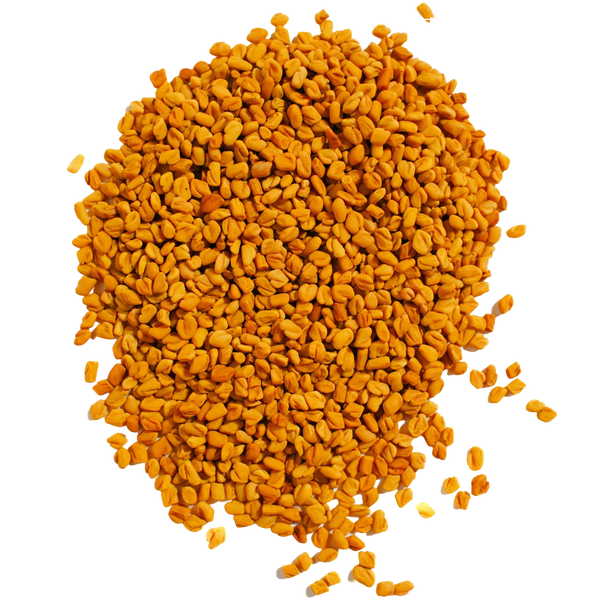
Fenugreek
Fenugreek is a herb native to parts of Asia and the Mediterranean, commonly used in both traditional medicine and cooking. At the equivalent strength and dosage of our extract, fenugreek has been shown in studies to double free testosterone - translating into better muscle growth, sexual health, and fat burning - within two months.
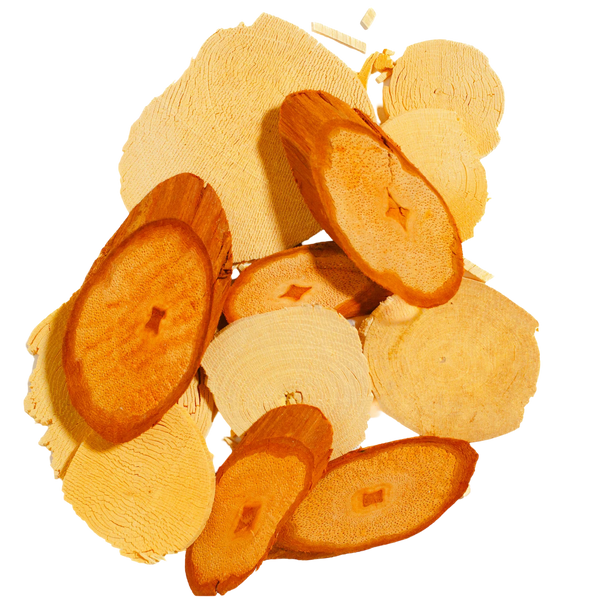
Tongkat Ali
Tongkat ali, also known as Eurycoma longifolia, is a medicinal plant native to Southeast Asia, particularly Malaysia and Indonesia. This botanical can boost both testosterone and erectile performance even at half the dose included here.
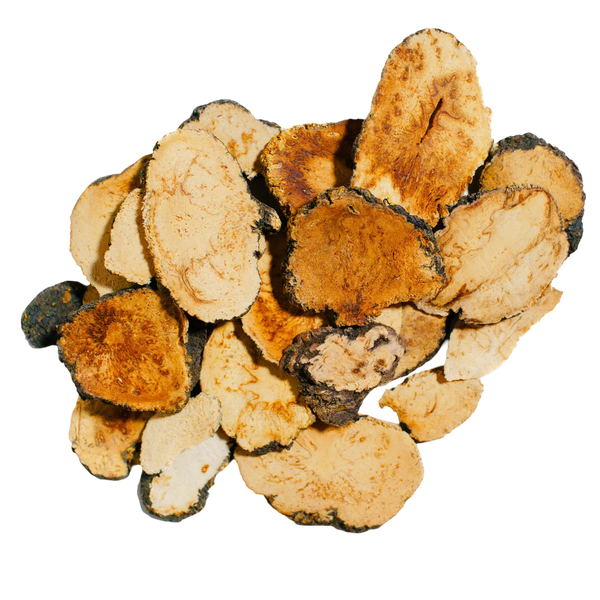
Maca
Maca is a nutrient-dense plant native to the high Andes mountains of Peru, and its root is traditionally utilized for its energizing and fertility-boosting properties. Studies show that it can improve erectile performance and double sexual desire within three months.
Customer reviews
What customers are saying about sleep support+ *- MherVerified BuyerI recommend this productRated 5 out of 5 stars1 week agoIt Works Beautifully.
I have spent years searching for an over-the-counter, natural testosterone booster that actually works without being excessive or harmful. I’ve tried nearly all of the “latest and greatest” brand-name testosterone boosters on the market, and unfortunately, every one of them caused severe negative reactions for me.
With other products, I experienced hives, intense anger, overwhelming anxiety and panic, impatience, irritability, and severe insomnia. Because of that history, I was extremely hesitant to try yet another supplement.
Testosterone Support by Innerbody Labs was completely different.
From the very first day, I experienced no negative side effects at all. Instead, I felt motivated, energized, and confident in my own body. Every ingredient in this formula feels thoughtfully chosen, well-researched, and carefully balanced to provide benefits without overstimulation.
Within the first week, I noticed dramatic improvements in my sleep quality and a profound reduction in anxiety. I say this as someone who has struggled with chronic and debilitating anxiety and panic for years. I felt calm, relaxed, and comfortable in my own nervous system — something I hadn’t experienced before with any supplement.
I started with half the recommended dose for the first week, and once my body adjusted, I increased to the full daily dose. The results have been remarkable. My anxiety and mood swings are gone, my sleep is the best it has ever been, my libido returned strongly, and my muscle…
Was this helpful? - BarnabyI recommend this productRated 5 out of 5 stars1 month ago5 Stars
Efficiency
Was this helpful? - Manuel J.Verified BuyerI recommend this productRated 5 out of 5 stars2 months agoQuality Product
I started incorporating this supplement for into my daily routine for the past 3 months. At 43 yrs old my testosterone level in March was 180 and although I was offered to start on TRT I wanted to try and see if I could improve my levels using an alternate solution. I have lost over 80lbs in the last 10 months utilizing a healthy diet and regular exercise but in the last couple of months since starting this product I have seen a drastic change in my body composition, energy levels, sexual function and mental clarity. I do believe this product is helping improve my personal mens health and I would recommend this product to anyone wanting to try an alternate option to TRT.
Was this helpful?
Pairs best with
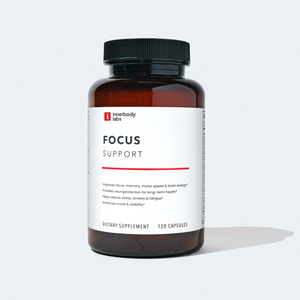
Focus Support
Perform at your peak: Advanced cognitive support for focus, memory, mood, and calm.

NAD+ Support
Unlock longevity: Sustained NAD+ to optimize cellular health for ageless vitality.
Frequently Asked Questions
What is testosterone, and why is it important?
Testosterone is the primary male sex hormone and plays a role in the hormonal health of women as well. It’s responsible for the fetal development of male sex organs and the masculinizing effects of puberty, like a deepening voice, increased body hair, and the onset of fertility.
In adulthood, testosterone also regulates libido and sperm production, but its role extends far beyond sexual health or masculinity. It can control the balance between muscle and fat throughout the body while also ensuring sufficient bone strength as you age. Testosterone levels affect mood and energy levels and even influence the production of red blood cells.
Testosterone levels decline naturally as you age, with the most significant dropoff period beginning at around 40, after which you can lose up to 1% of your testosterone production every year.
How did Innerbody choose the ingredients in Testosterone Support?
We carefully formulated this supplement by following the science. Over the past several years, we spent thousands of hours poring over hundreds of research studies focused on what substances — vitamin, mineral, botanical — can safely and most reliably boost testosterone.
Why is copper included in this supplement?
We’ve included copper in our supplement because we’ve also included zinc. Zinc has been shown to influence testosterone levels significantly. Copper hasn’t shown such influence, but research indicates that zinc supplementation can lead to copper deficiency, and we take great pains to ensure our product is as safe as it is effective.
Can I take Innerbody Testosterone Support with other supplements and medications?
While we formulated our supplement with safety in mind, as with any supplement, you should speak with your doctor before adding this supplement to your routine. This will ensure that the supplement is safe for you, specifically, based on your underlying health and any medications you are currently taking.
Do you ship internationally?
At this time, no, we only ship to customers in the United States. If you are located outside the United States, we encourage you to learn about other top supplements that we recommend in our guide to testosterone boosters (such as supplements made by TestoPrime and Roman).
Do you deliver to Army post office addresses?
Yes, we do.
How long will my order take to arrive?
Shipping times do vary, but orders typically arrive on an average of 3-4 business days.
How soon can I expect to see results?
Some may begin to notice results within the first week of use, while others will notice results several weeks or months later.
The ingredients within Testosterone Support improve testosterone levels and target the symptoms of low testosterone in different ways. Given this diversity of ingredients we’ve included, you could feel an increase in libido within days, though the full effects of the supplement and its impact on measurable testosterone levels will likely take closer to 12 weeks to arrive at their peak. After that, consistent use can maintain those positive results.
How many capsules do I need to take per day?
The suggested daily serving of Innerbody Testosterone Support is four (4) capsules per day.
When is the best time of day to take Testosterone Support?
You can take Testosterone Support whenever it’s convenient for you within a given day. The ingredients aren’t intended to have instant effects, but men interested in maintaining the highest possible T levels might consider taking it in the morning. Testosterone levels are at their highest after you wake up, and they decline throughout the day, hitting their low in the evening. Taking your Testosterone Support dose with breakfast may influence that daily decline.
Do I need to cycle Innerbody Testosterone Support?
No, you do not need to cycle Innerbody Testosterone Support. None of our ingredients have shown evidence of accumulated tolerance or toxicity with long-term use.
Can women take Innerbody Testosterone Support?
Innerbody Testosterone Support is intended for adult males. Women should consult with a physician before taking Innerbody Testosterone Support. We formulated this supplement specifically to support men’s testosterone levels, though there could be medical occasions where its ingredients could be recommendable to a woman, however rare those may be.
Have other questions? Reach out!
You can reach us at support@innerbody.com.

